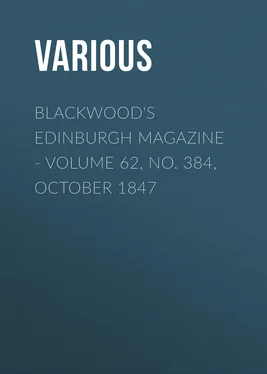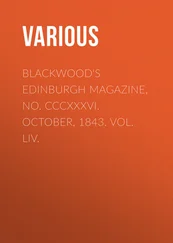Various - Blackwood's Edinburgh Magazine - Volume 62, No. 384, October 1847
Здесь есть возможность читать онлайн «Various - Blackwood's Edinburgh Magazine - Volume 62, No. 384, October 1847» — ознакомительный отрывок электронной книги совершенно бесплатно, а после прочтения отрывка купить полную версию. В некоторых случаях можно слушать аудио, скачать через торрент в формате fb2 и присутствует краткое содержание. Издательство: Иностранный паблик, Жанр: foreign_antique, periodic, foreign_edu, на английском языке. Описание произведения, (предисловие) а так же отзывы посетителей доступны на портале библиотеки ЛибКат.
- Название:Blackwood's Edinburgh Magazine - Volume 62, No. 384, October 1847
- Автор:
- Издательство:Иностранный паблик
- Жанр:
- Год:неизвестен
- ISBN:нет данных
- Рейтинг книги:5 / 5. Голосов: 1
-
Избранное:Добавить в избранное
- Отзывы:
-
Ваша оценка:
- 100
- 1
- 2
- 3
- 4
- 5
Blackwood's Edinburgh Magazine - Volume 62, No. 384, October 1847: краткое содержание, описание и аннотация
Предлагаем к чтению аннотацию, описание, краткое содержание или предисловие (зависит от того, что написал сам автор книги «Blackwood's Edinburgh Magazine - Volume 62, No. 384, October 1847»). Если вы не нашли необходимую информацию о книге — напишите в комментариях, мы постараемся отыскать её.
Blackwood's Edinburgh Magazine - Volume 62, No. 384, October 1847 — читать онлайн ознакомительный отрывок
Ниже представлен текст книги, разбитый по страницам. Система сохранения места последней прочитанной страницы, позволяет с удобством читать онлайн бесплатно книгу «Blackwood's Edinburgh Magazine - Volume 62, No. 384, October 1847», без необходимости каждый раз заново искать на чём Вы остановились. Поставьте закладку, и сможете в любой момент перейти на страницу, на которой закончили чтение.
Интервал:
Закладка:
Again darkness surrounded the Rosicrucian—again the awful voice resounded in his imagination.
"Behold!" it said, "the sorrows of the great and virtuous when the light is quenched: behold the divine prerogative of those who see! And know, Balsamo, that such are the boons thou hast contemned—such are the faculties thou hast polluted."
MIRABEAU
After a scarcely perceptible pause, the Voice resumed: "The miseries of those who have abused or lost the powers of seeing, of tasting, or of feeling, have been revealed to thee, O sceptic! Thine eyes have penetrated into the dim retrospections of the past. Look onwards, Balsamo, and thou shalt discern the things that are germinating in the womb of the future."
Cagliostro had scarcely heard this assurance when the curtain hitherto impenetrable to mortal, was raised—the dread shadows of the future were dispelled. He found himself in the upper apartment of one of the most distinguished mansions in Paris. The chamber, which was lofty and spacious, was enriched with the most costly furniture, and the most gorgeous decorations. Pilasters, incrusted with marble, and enamelled with lapis-lazuli, broke the monotony of the walls and supported the ceiling with their capitals. Between these pilasters were pedestals surmounted with statuary and busts; and these, again, were reflected in the mirrors hung about the room in profusion. An almost oriental luxury characterised the Turkish carpets, as soft as the greensward, and the draperies of velvet which concealed the windows, and fell in graceful folds about a bed at the opposite end of the apartment. An antique candelabrum stood upon the mantelpiece and shed a rosy and voluptuous light over this domestic pomp, while some odorous gums crackled in a chafing-dish upon the hearth and loaded the air with their fragrance.
Familiar as the Rosicrucian was with splendour, his glance roved over these appurtenances with delight, for he had never before seen the evidences of wealth so enhanced by the evidences of refinement. He thought that the possession of such a dwelling would be something towards the realisation of happiness. In the very conception of that ignoble thought, however, he received a solemn and effectual admonition. Before him, in the silent chamber, on either side of it groups of attendants and men robed in the costumes of the court and the barracks, was a deathbed. It was the deathbed of an extraordinary being, the owner of all this grandeur. It was the deathbed of Honoré-Gabriel de Mirabeau.
The patrician demagogue reposed upon the pillows in the final stage of dissolution, and his broad forehead was already damp with the sweat of his last agony. Cagliostro surveyed the dying tribune with emotion, for in the very hideousness of his countenance there was a subtle and indefinable fascination. The gigantic stature which had so often awed the tumults of the National Assembly was prostrate. The voice, whose brazen tones had sounded like a trumpet over the land, was hushed—that voice which had exclaimed with such sublime significance to the Marseillais,—"When the last of the Gracchi expired, he flung dust towards heaven, and from this dust sprang Marius!"—that voice which had conquered the aversion of Mademoiselle de Marignan with its seductive melody—that voice which had been at once the oracle of the king and the law of the rabble. Mirabeau lay before the Rosicrucian, with his natural ugliness rendered yet more repulsive by the tokens of a terrible malady. The touch of death imparted additional horror to the massive deformity of his skull, to the coarseness of his pockmarked features, to his sunken eyeballs, to his cheeks scared by disease, to his hair bristling and dishevelled like that of a gorgon. Still, through all these unsightly and almost loathsome peculiarities, there was perceptible a sort of masculine susceptibility. It was that susceptibility which gave zest to his debaucheries, and occasionally subdued into pathos the storms of his dazzling and sonorous eloquence.
Конец ознакомительного фрагмента.
Текст предоставлен ООО «ЛитРес».
Прочитайте эту книгу целиком, на ЛитРес.
Безопасно оплатить книгу можно банковской картой Visa, MasterCard, Maestro, со счета мобильного телефона, с платежного терминала, в салоне МТС или Связной, через PayPal, WebMoney, Яндекс.Деньги, QIWI Кошелек, бонусными картами или другим удобным Вам способом.
1
The Improvisatore; or, Life in Italy , from the Danish of Hans Christian Andersen. Translated by Mary Howitt.
Only a Fiddler! and O.T. or, Life in Denmark , by the Author of The Improvisatore . Translated by Mary Howitt.
A True Story of my Life , by Hans Christian Andersen. Translated by Mary Howitt.
Tales from Denmark . Translated by Charles Bonar.
A Picture-Book without Pictures . Translated by Meta Taylor.
The Shoes of Fortune, and other Tales .
A Poet's Bazaar . Translated by Charles Beckwith, Esq.
2
See Allan Cunningham's Lives of the Painters and Sculptors , vol. ii. p. 150.
3
Not very clearly expressed by the translator. One would think that our Saviour, in his progress to the cross, had passed through the area of the Coliseum, and not that each of the pictures on these altars represented one of the resting-points, &c. Mrs Howitt is sometimes hasty and careless in her writing. And why does she employ such expressions as these:—"many white buttons," "beside of it," "beside of us?" We have read a many English books, but never met them in anyone beside of this.
4
Vol. x, Nov. 1821, p. 373.
5
Béranger has already conveyed this truth through the melody of his delicious verse:—
"Le vois-tu bien, là-bas, là-bas,
Là-bas, là-bas? dit l'Espérance;
Bourgeois, manants, rois et prelats
Lui font de loin la révérence.
C'est le Bonheur, dit l'Espérance.
Courons, courons; doublons le pas,
Pour le trouver là-bas, là-bas,
Là-bas, là-bas."
6
"I did not dare to breathe aloud the unhallowed anguish of my mind to the majesty of the unsympathising stars."—See Falkland .
7
"Motus autem siderum," such is the reverent and sententious remark of Grotius, "qui eccentrici, quique epicyclici dicuntur, manifeste ostendunt non vim materiæ, sed liberi agentis ordinationem ."—See De Veritate Rel. Christ. Lib. i. § 7.
8
"Now, there was a word spoken to me in private, and my ears, by stealth as it were, received the veins of its whisper."— Job , chap. iv. verse 12.
9
"There is a roaring in the bleak-grown pines
When Winter lifts his voice; there is a noise
Among immortals when a god gives sign
With hushing finger, how he means to load
His tongue with the full weight of utterless thought,
With thunder, and with music, and with pomp."
Such are the majestic syllables which preface the speech of Saturn in Hyperion . Keats was ridding himself of the puerilities of Cockaigne when he wrote that fragment of an epic—a fragment which is unsurpassed by any modern attempt at heroic composition. In reading it, the very earth seems shaking with the footsteps of fallen divinities. Even Byron, who, like ourselves, had no great predilection for the school in which the poetic genius of John Keats was germinated, has emphatically said of Hyperion that "it seems actually inspired by the Titans, and is as sublime as Æschylus."—See Byron's Works , vol. xv., p. 92.
Читать дальшеИнтервал:
Закладка:
Похожие книги на «Blackwood's Edinburgh Magazine - Volume 62, No. 384, October 1847»
Представляем Вашему вниманию похожие книги на «Blackwood's Edinburgh Magazine - Volume 62, No. 384, October 1847» списком для выбора. Мы отобрали схожую по названию и смыслу литературу в надежде предоставить читателям больше вариантов отыскать новые, интересные, ещё непрочитанные произведения.
Обсуждение, отзывы о книге «Blackwood's Edinburgh Magazine - Volume 62, No. 384, October 1847» и просто собственные мнения читателей. Оставьте ваши комментарии, напишите, что Вы думаете о произведении, его смысле или главных героях. Укажите что конкретно понравилось, а что нет, и почему Вы так считаете.












